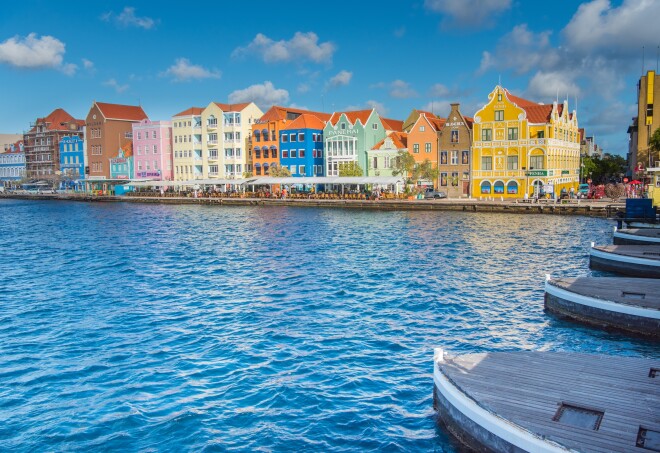Overview
When’s the best time to go to Curaçao?
Curaçao conveniently lies outside of the hurricane belt and offers agreeable tropical weather year round. The occasional downpours usually fall between October and December, while August and September can be exceptionally hot, with temperatures reaching 90 degrees.
During high season on the island—October to December—hotel and car rental prices are higher than average. The people of Curaçao like to party, particularly during Carnival celebrations that usually take place in February. If bacchanalia isn’t your thing, head to a beach to enjoy it being nearly deserted while the rest of the island celebrates at parades.
How to get around Curaçao
Due in part to effective tourism campaigns and the power of social media, Curaçao has seen an immense surge in non-European visitors in recent years. The island now enjoys direct flights from Miami, Charlotte, New York, Toronto, Panama, and Bogotá, as well as almost daily flights from Amsterdam.
Although Curaçao’s bus system is efficient, renting a car is still the most reliable way to get around the island, particularly to locations that public transportation doesn’t include in its routes, like secluded beaches and hidden caves.
Can’t miss things to do in Curaçao
- Look for art pieces hidden inside thorny walls as you walk the labyrinth that is the Cathedral of Thorns, a magnificent sculpture the size of a building at Landhuis Bloemhof.
- If it’s adventure you crave, stop at the blowhole Suplado (aka the Natural Jacuzzi) on Curaçao’s north coast. Bring your swimsuit. This adventure can get very wet.
- No urban art lover should miss exploring the gentrified neighborhoods of Skalo and Pietermaai on the Punda side of Willemstad, which include impressive murals by local artists, such as Francis Sling and Sander van Beusekom.
Food and drink to try in Curaçao
- Grab a Pan ku Karni stobá, bread filled with stew beef, or a Pan ku Karko, which is stuffed with conch at one of the many food trucks found all over the island, especially the eastern side, Bandariba.
- The Marche Bieu, or Old Market, in Punda is the best place to eat Krioyo, true Curaçaon cuisine. Walk around before ordering and get there a little before the lunch rush at 12:30. Most of the food will be sold out by 3 p.m.
- The Blue Curaçao distillery is a nice activity, but for a more local experience, head to Breedestraat in Otrabanda to the oldest bar on the island, Netto Bar, for the Rom Berde or green rum, exclusively sold there. You might want to purchase a bottle for home since no one will believe you had green rum.
- Most businesses close for lunch between 12 and 2 p.m., which is when restaurants will be at their fullest midday.
- The trendier eateries on the island—in Pietermaai and across from the Avila Beach Hotel—are mostly owned by Dutch expats and serve a more European and international cuisine.
Culture in Curaçao
Curaçao is a country within the kingdom of the Netherlands; although the island’s official language is Dutch, most locals speak Papiamento, a Portuguese-based Creole. English is also widely used. The island’s close proximity to Venezuela means a strong Latin American influence is audible in the merengue, salsa, and bachata frequently played at bars all over the island. Curaçao’s culture has always been deeply rooted in African traditions brought to the island by enslaved Africans, like Tambú and Tumba music, as well as the food and local dialect.
Local travel tips for Curaçao
- The standard voltage on the island is 127 volt, but some hotels and vacation rentals have switched to 220 volt. Bring an adapter if you are unsure of which voltage your accommodation uses.
- When the Queen Emma bridge is open for large cruise ships, you can take the free ferry from Punda to Otrabanda or vice versa. Midway on crossing, snap a picture of the impressive bridge.
- Most Curaçaons really dress up when going out. If you want to be in with the crowd, pack some dress shirts and beautiful dresses.
- It’s considered rude not to say bondia (“good morning”), bontardi (“good afternoon”), or bonochi (“good evening”) when entering a store or before starting a conversation.
- Curaçaons are very friendly and will often go out of their way to help lost tourists with directions, even sometimes offering a ride to make sure they get to their destination.
- Tipping is not required but appreciated.
- The local currency is the nafl, or Netherlands Antilles Florin, which on Curaçao is at a fixed 1.75 to the U.S. dollar (which is also widely accepted on the island).
- Many of the more popular beaches will charge an entry fee. Head west for free and public beaches but pack the essentials because few of these beaches have facilities.
- Most beaches on Curaçao have shorelines with dead coral and rocks instead of white sand, but they are still stunning and the water is second to none.
Guide Editor
Essentials and beach coverage by Caribbean-based freelance travel writer and content creator Riselle Celestina (@thetravelingislandgirl). Best Things to Do by lifestyle and travel writer Tracy E. Hopkins. Hotels coverage by travel and design writer Laura Feinstein. Required Eating and history coverage by travel and culture writer Rosalind Cummings-Yeates (@farsightedgirl).







